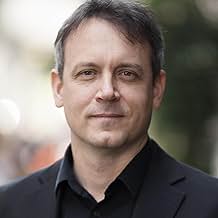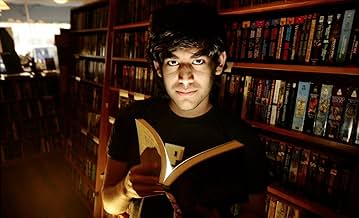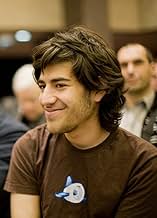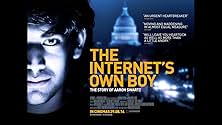The story of programming prodigy and information activist Aaron Swartz, who took his own life at the age of 26.The story of programming prodigy and information activist Aaron Swartz, who took his own life at the age of 26.The story of programming prodigy and information activist Aaron Swartz, who took his own life at the age of 26.
- Awards
- 4 wins & 4 nominations total
Aaron Swartz
- Self
- (archive footage)
Stephen Heymann
- Self - Asst. U.S. Attorney Massachusetts
- (archive footage)
- Director
- Writer
- All cast & crew
- Production, box office & more at IMDbPro
Featured reviews
9xWRL
This warm yet chilling documentary retraces the life of Aaron Swartz, who committed suicide at age 26 after a couple of years of severe and deepening pressure from the criminal justice system, which was trying him for a number of felonies resulting from his breaking into MIT's computers.
We first see him as a young kid in home movies, then as a prodigy who while very young was brimming with new ideas for the Internet and applied genius-level programming skills to co-developing RSS and Reddit. Bored with college and with working for the business establishment, he turned to activism, promoting an open Web culture for the benefit of all users.
Swartz's activism turned into hacktivism, landing him in deep trouble with the Justice Department, which charged him with crimes that could have sent him to prison for 35 years. Touching, pointed accounts from family members and close associates describe what Aaron was like and how he responded to unyielding Justice Department efforts to use him as an example.
The interviews with law professor Lawrence Lessig and World Wide Web inventor Tim Berners-Lee are unforgettably moving. The film does a good job of calling into question Swartz's harsh treatment by the same Justice Department that shied away from prosecuting the big money interests that brought down our financial system.
Whether you sympathize with Swartz or not, the film does a solid job of showing how blind justice in the U.S. can be when it wants to be.
We first see him as a young kid in home movies, then as a prodigy who while very young was brimming with new ideas for the Internet and applied genius-level programming skills to co-developing RSS and Reddit. Bored with college and with working for the business establishment, he turned to activism, promoting an open Web culture for the benefit of all users.
Swartz's activism turned into hacktivism, landing him in deep trouble with the Justice Department, which charged him with crimes that could have sent him to prison for 35 years. Touching, pointed accounts from family members and close associates describe what Aaron was like and how he responded to unyielding Justice Department efforts to use him as an example.
The interviews with law professor Lawrence Lessig and World Wide Web inventor Tim Berners-Lee are unforgettably moving. The film does a good job of calling into question Swartz's harsh treatment by the same Justice Department that shied away from prosecuting the big money interests that brought down our financial system.
Whether you sympathize with Swartz or not, the film does a solid job of showing how blind justice in the U.S. can be when it wants to be.
This non-fictional film documents the devastating and mortifying story of the the late Aaron Swartz and his battle with politics and the US justice system. It's heartwarming, funny, and tearful. You'll need to sit down to watch this one.
Anyone that uses computers should watch this film!
The film implied important questions:
1. Do computer users have any rights in the United States at all? If not, do the lawmakers not know enough about computers to make them?
2. Why do US Federal prosecutors threaten computer users when the "injured parties" state that they do not seek prosecution?
3. Why does a university like MIT not protect the fundamental rights of its students?
4. Isn't the primary role of a university to protect and nourish the fundamental rights of students before teaching can occur?
5. How much of Aaron's prosecution was based on legal precedent and how much of it was politically motivated?
6. Should any amount of politics be tolerable in a legal case where someone's life is on-the-line?
7. Why is the U.S. secret service prosecuting civilians in matters not related to national security?
I cannot begin to answer these questions by myself, but someone much smarter than me, like Aaron, may have been able to.
Computer experts have historically been blamed for the mistakes of others that did not know what they were doing with technology. Experts are threatened, scared into submission, and punished for the smallest infraction. Schools, governments, and everyday people are scared of computer experts and the power they command.
This movie leads one to believe that the nation's leaders are letting their fears control their decisions about technology instead of seeking out the experts and being open about their policies. This film covers all of this and more.
It most importantly serves as Aaron's story. Aaron is portrayed as a brilliant young computer expert that won't give up. It shows Aaron from a young age up until his last moments. His family, his friends, dreams and aspirations are all present. It shows his success at business and his genius. The filmmakers did an amazing job in making this beautiful film. This a tribute to Aaron's life and work.
I highly recommend watching this film.
Anyone that uses computers should watch this film!
The film implied important questions:
1. Do computer users have any rights in the United States at all? If not, do the lawmakers not know enough about computers to make them?
2. Why do US Federal prosecutors threaten computer users when the "injured parties" state that they do not seek prosecution?
3. Why does a university like MIT not protect the fundamental rights of its students?
4. Isn't the primary role of a university to protect and nourish the fundamental rights of students before teaching can occur?
5. How much of Aaron's prosecution was based on legal precedent and how much of it was politically motivated?
6. Should any amount of politics be tolerable in a legal case where someone's life is on-the-line?
7. Why is the U.S. secret service prosecuting civilians in matters not related to national security?
I cannot begin to answer these questions by myself, but someone much smarter than me, like Aaron, may have been able to.
Computer experts have historically been blamed for the mistakes of others that did not know what they were doing with technology. Experts are threatened, scared into submission, and punished for the smallest infraction. Schools, governments, and everyday people are scared of computer experts and the power they command.
This movie leads one to believe that the nation's leaders are letting their fears control their decisions about technology instead of seeking out the experts and being open about their policies. This film covers all of this and more.
It most importantly serves as Aaron's story. Aaron is portrayed as a brilliant young computer expert that won't give up. It shows Aaron from a young age up until his last moments. His family, his friends, dreams and aspirations are all present. It shows his success at business and his genius. The filmmakers did an amazing job in making this beautiful film. This a tribute to Aaron's life and work.
I highly recommend watching this film.
The Internet's Own Boy was very well-received at its showing in Austin's SXSW Film Festival. The film is simultaneously a biography of the tragic death of internet pioneer Aaron Swartz and at the same time a fascinating history of the development of the online political movements that he devoted his life to. The film tells a fascinating story of young genius deeply involved in the early development of the internet including co-founding of Reddit. His genius is unquestionable. The film really provides a tribute to a talented young man and presents a strong case that he was unjustly and selectively prosecuted and overcharged by an overzealous prosecutor. This prosecution seems to have provoked his suicide.
But the film is unable to establish any real emotional distance from its subject in order to present an objective full picture of Aaron. Early scenes show home movie pictures of Aaron as an adorable precocious toddler playing with his brothers. From this beginning it is impossible to establish the emotional independence necessary to shine any sort of critical light on Aaron's life or activities. The interviews are all with his family, friends and supporters and don't really critique his efforts. He becomes a victim who despite his incredible genius seems to lose responsibility for his own actions including his own suicide. He becomes purely a victim of government persecution with no real responsibility for his own life decisions including his various hacking activities that ultimately lead to his arrest.
The film really presents Aaron Swartz as a modern-day martyr for the cause of an open access to the internet that he deeply believed in and dedicated himself to. Perhaps because of his recent and tragic death the filmmaker seems unwilling to question the ethics of Aaron's hacker-like tactics. There really aren't any voices raising serious questions about whether his efforts to take the law into his own hands by downloading millions of documents was truly an appropriate form of civil disobedience. He did, in fact, steal millions of articles and violate intellectual property rights through his actions. He undoubtedly believed that what he was doing was right and just.
The film is thus more of a tribute to his life and a critique of the criminal justice system than it is a balanced examination of his controversial history which deserves closer examination. The filmmaker seems to be too close to Aaron's legacy to present a truly objective self-critical examination of his legacy and his somewhat radical view of open access to knowledge and information. While it is easy to argue for that view, it overlooks the complexity of case for protecting intellectual property rights.
Ironically, Aaron seems more far impressive and righteous when he is fighting successfully to defeat the SOPA bill than when he is stealing copyrighted materials. This showed his remarkable ability to organize online and unify people in a collective action that made a real difference for the future of the internet. The tragedy is that this great young activist self-destructed. The filmmaker turns his heroism into victimization and I think may actually undermine his own effort to pay tribute to Aaron. The best tributes are those that are present a complete picture rather than build-up a myth. Never-the-less, despite its flaws this is a powerful and important film that is highly recommended to begin to understand who Aaron Swartz was and to learn about the important issues of intellectual freedom online that he devoted himself to.
But the film is unable to establish any real emotional distance from its subject in order to present an objective full picture of Aaron. Early scenes show home movie pictures of Aaron as an adorable precocious toddler playing with his brothers. From this beginning it is impossible to establish the emotional independence necessary to shine any sort of critical light on Aaron's life or activities. The interviews are all with his family, friends and supporters and don't really critique his efforts. He becomes a victim who despite his incredible genius seems to lose responsibility for his own actions including his own suicide. He becomes purely a victim of government persecution with no real responsibility for his own life decisions including his various hacking activities that ultimately lead to his arrest.
The film really presents Aaron Swartz as a modern-day martyr for the cause of an open access to the internet that he deeply believed in and dedicated himself to. Perhaps because of his recent and tragic death the filmmaker seems unwilling to question the ethics of Aaron's hacker-like tactics. There really aren't any voices raising serious questions about whether his efforts to take the law into his own hands by downloading millions of documents was truly an appropriate form of civil disobedience. He did, in fact, steal millions of articles and violate intellectual property rights through his actions. He undoubtedly believed that what he was doing was right and just.
The film is thus more of a tribute to his life and a critique of the criminal justice system than it is a balanced examination of his controversial history which deserves closer examination. The filmmaker seems to be too close to Aaron's legacy to present a truly objective self-critical examination of his legacy and his somewhat radical view of open access to knowledge and information. While it is easy to argue for that view, it overlooks the complexity of case for protecting intellectual property rights.
Ironically, Aaron seems more far impressive and righteous when he is fighting successfully to defeat the SOPA bill than when he is stealing copyrighted materials. This showed his remarkable ability to organize online and unify people in a collective action that made a real difference for the future of the internet. The tragedy is that this great young activist self-destructed. The filmmaker turns his heroism into victimization and I think may actually undermine his own effort to pay tribute to Aaron. The best tributes are those that are present a complete picture rather than build-up a myth. Never-the-less, despite its flaws this is a powerful and important film that is highly recommended to begin to understand who Aaron Swartz was and to learn about the important issues of intellectual freedom online that he devoted himself to.
I don't know why the Aaron Swartz story was never on my radar, which is one of the reasons why The Internet's Own Boy was an eye-opener. His is a tragic story, and although the filmmakers secured screen time with (almost) all involved, it's sad that all we have from Swartz is archival webcam interview footage. The movie makes a persuasive case for his being made a high-profile example by the justice system, and there's enough here to leave you either irate or fearful (or both).
Whether or not you agree with the man's politics, he made a difference - hell, he was instrumental in getting SOPA struck down, so he deserves our respect for that - and his story brings to light the need for fine-tuning the ancient copyright laws. Either way, this documentary delivers.
7/10
Whether or not you agree with the man's politics, he made a difference - hell, he was instrumental in getting SOPA struck down, so he deserves our respect for that - and his story brings to light the need for fine-tuning the ancient copyright laws. Either way, this documentary delivers.
7/10
Orin Kerr, professor and former federal prosecutor, describes the motivation of the government's case as their fear that, as stated in his "Open Access Manifesto", Aaron believed it was a moral imperative to be committed to breaking the law to overcome a law that was unjust, and that, if allowed to succeed in "nullifying" the law, that everyone would have access to the data base and therefore "the toothpaste would be out of the tube" and somehow chaos would ensue, or as he phrases it, "Swartz's side would win". Apparently, free access to scholarly and scientific journals must be restricted to protect the people from themselves.
There is also the issue of civil disobedience in general and the ways those in power portray such actions and those who encourage them. As one other reviewer here states, "when you commit an act of criminal civic disobedience, you should do so accepting that you will most likely pay the price for that action". That is true, however, as Gilbert and Sullivan suggested, the punishment should fit the crime, especially when, as in this case, the "crime" is questionable at best. I wonder how the current US administration would view the acts of Gandhi or Mandela were they occurring now and posing a threat to their political status quo and not seen safely through the rear view mirror of history. It wasn't that long ago that many in power in America considered Mandela , in particular, a "terrorist".
This excellent documentary is a cautionary tale that all free thinking and well meaning people must see and understand. Secrecy is power and governments will do whatever they can to protect it. As Aaron himself suggested, this is a battle that will never be won, but can never be abandoned.
See this film.
There is also the issue of civil disobedience in general and the ways those in power portray such actions and those who encourage them. As one other reviewer here states, "when you commit an act of criminal civic disobedience, you should do so accepting that you will most likely pay the price for that action". That is true, however, as Gilbert and Sullivan suggested, the punishment should fit the crime, especially when, as in this case, the "crime" is questionable at best. I wonder how the current US administration would view the acts of Gandhi or Mandela were they occurring now and posing a threat to their political status quo and not seen safely through the rear view mirror of history. It wasn't that long ago that many in power in America considered Mandela , in particular, a "terrorist".
This excellent documentary is a cautionary tale that all free thinking and well meaning people must see and understand. Secrecy is power and governments will do whatever they can to protect it. As Aaron himself suggested, this is a battle that will never be won, but can never be abandoned.
See this film.
Did you know
- Quotes
First Title Cards: Unjust Laws exist; shall we be content to obey them, or shall we edeavor to amend them, and obey them until we have suceeded, or shall we transgress them at once?- Henry David Thoreau
- ConnectionsFeatures Le Magicien d'Oz (1939)
- SoundtracksExtraordinary Machine
Written and Performed by Fiona Apple
- How long is The Internet's Own Boy: The Story of Aaron Swartz?Powered by Alexa
Details
- Release date
- Country of origin
- Official site
- Language
- Also known as
- Internets underbarn
- Production companies
- See more company credits at IMDbPro
Box office
- Gross US & Canada
- $48,911
- Opening weekend US & Canada
- $21,705
- Jun 29, 2014
- Gross worldwide
- $48,911
- Runtime
- 1h 45m(105 min)
- Color
- Aspect ratio
- 1.78 : 1
Contribute to this page
Suggest an edit or add missing content






























